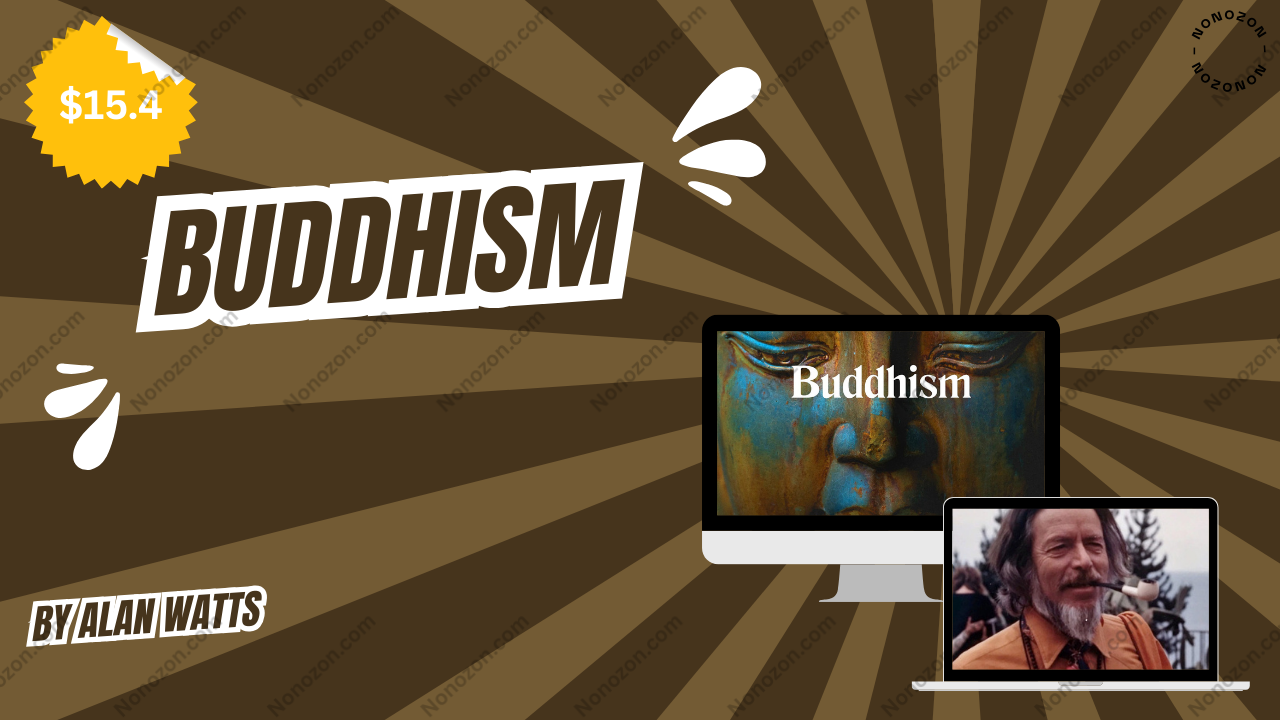Buddhism
by Alan Watts
Get Buddhism by Alan Watts Digital Download!
You can check proof of content here

Buddhism by Alan Watts
Overview

Buddhism: A Faith Beyond Faith – A Review of Alan Watts’ Insightful Work
Among the wealth of spiritual writings, Buddhism: The Religion of No Religion by Alan Watts stands as a distinctive contribution that distills Buddhist wisdom into clear and practical insights. Rather than simply exploring religious rituals or doctrine, the book offers a thoughtful reflection on the nature of existence, human consciousness, and the transformative power of Buddhist ideas. Through a collection of compelling essays, Watts bridges the gap between Eastern spiritual traditions and the modern Western mindset, guiding readers on a path of awareness and inner transformation. His work illuminates the interwoven nature of life, encouraging personal exploration and a deeper sense of unity.
Watts portrays Buddhism as far more than a formal set of beliefs; he presents it as a living, evolving journey rooted in direct experience. This refreshing take invites readers to see Buddhism not as a rigid system to be followed blindly, but as a freeing exploration of the self and its connection to the world. In this review, we’ll examine the central themes of the book, focusing on Watts’s treatment of suffering, detachment, and the spiritual path toward awakening.
Buddhism as a Living Journey
Alan Watts describes Buddhism as an ongoing, dynamic unfolding rather than a fixed set of teachings. This characterization breaks away from conventional religious paradigms, favoring a view that embraces personal growth and experiential learning. Rather than advocating for unchanging dogmas, Watts encourages readers to approach Buddhism as a dialogue with life—one that continually evolves through awareness and reflection.
At the core of this perspective is the principle of interdependence, a fundamental Buddhist concept Watts revisits often. Everything, he explains, is interconnected—our identities, thoughts, and experiences are all part of a larger whole. One powerful example is the Bodhisattva ideal: enlightenment is not pursued for oneself alone but shared in service of others. In this framework, awakening becomes a compassionate, collective process.
By framing Buddhism in this fluid, exploratory way, Watts opens the door for readers—especially those disillusioned by traditional religion—to view spirituality through a more personal, inclusive lens. This approach speaks to the modern seeker, offering relevance without requiring conformity.
The Middle Way: Embracing Balance in Spiritual Practice
Watts places significant emphasis on the Middle Way, a foundational principle in Buddhism that advocates moderation over extremism. It encourages spiritual seekers to find a balanced path—avoiding both indulgence and severe austerity—and to recognize that tools and teachings are stepping stones, not final destinations.
The Middle Way promotes an attitude of openness and curiosity, freeing individuals from black-and-white thinking. Watts’s famous quote, “Life is not a struggle; life is a play,” captures the spirit of this approach, inviting readers to live with spontaneity and joy rather than tension and control.
This balanced mindset is essential in today’s diverse and interconnected world. By allowing flexibility in thought and practice, the Middle Way creates space for multiple perspectives and peaceful coexistence across traditions. Watts’s framing helps make this concept accessible and deeply meaningful for contemporary audiences.
Suffering and the Four Noble Truths
One of the most impactful sections of the book is Watts’s interpretation of the Four Noble Truths, the cornerstone of Buddhist thought. He moves beyond rote explanation and instead weaves these principles into relatable reflections on the human experience. His use of metaphors and personal stories brings suffering—dukkha—into a clear and human light.
The Four Noble Truths are outlined as:
The Reality of Suffering: Suffering is an inevitable part of life.
The Origin of Suffering: Our attachments and cravings give rise to suffering.
The End of Suffering: Liberation is possible through awareness and acceptance.
The Path to Liberation: Mindfulness, ethical living, and inner discipline provide a way forward.
Watts's interpretation focuses on the idea that suffering is not something to be feared or resisted, but understood. This understanding allows for a freedom that transcends ordinary existence. His insights underscore how awareness of suffering can act as a catalyst for awakening, rather than a source of despair.
The Raft Metaphor: Releasing the Tools When the Time Comes
Watts brilliantly employs the raft metaphor to illustrate a key Buddhist teaching on detachment. Just as a raft helps a person cross a river but is no longer needed afterward, so too should spiritual teachings be released once they’ve served their purpose. Clinging to ideas or practices beyond their utility can hinder further progress on the path.
In this context, Watts reminds readers that spiritual methods are not absolute truths. They are supportive tools to be used with intention, not doctrines to be idolized. The journey toward insight and awakening is about moving beyond attachment—even to the very tools that helped us grow.
This flexible, practical attitude toward spirituality allows for deeper engagement without becoming trapped by ideology. It empowers individuals to shape their own paths while remaining open to change and growth.
Final Thoughts: A Work of Lasting Spiritual Value
Buddhism: The Religion of No Religion is a landmark in spiritual literature, offering fresh perspectives that resonate with both seasoned seekers and newcomers to Buddhist thought. Through his graceful prose and thought-provoking analysis, Alan Watts demystifies Buddhist philosophy while preserving its depth. His work serves as both a spiritual guide and an invitation to reflect inwardly.
For those who feel confined by organized religion or yearn for a more personal spiritual connection, Watts’s writing offers a liberating alternative. He invites us to see Buddhism not as a static system but as an unfolding process—one that calls us into the present moment, into compassion, and into deeper awareness. In a world often marked by disconnection and confusion, his teachings continue to serve as a compass pointing toward clarity and meaning. Whether you’re curious about Eastern traditions or seeking a deeper understanding of life itself, this book is a rewarding and enlightening companion on the path.
Related products

Making Contact, Satir Process, Personal Workbook, Forgiving Parents PDF bundle
by Virginia Satir
$100.00
$38.50

Overcome Neediness, Attachment, Fears (Audio Seminar)
by Apollonia Ponti
$129.00
$15.40


